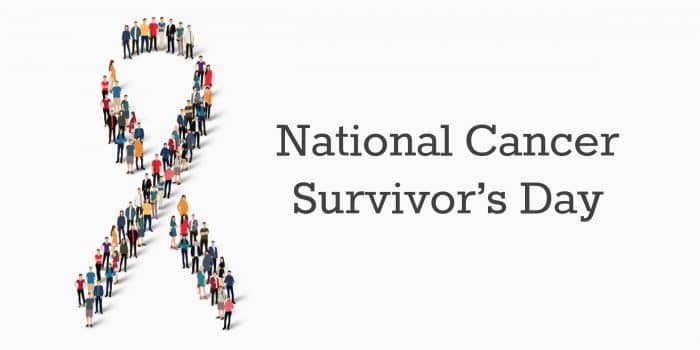Updated May 30, 2019
National Cancer Survivors Day is June 2, 2019. To celebrate, we have compiled quotes from cancer survivors and families to educate and inspire others.
“I’ve always viewed my family history and genetic information as another tool – knowledge is power – I believe that. It empowered me, helped me make treatment decisions, and guided how I should be followed going forward.”
— Cindy had breast cancer and discovered she is positive for a CHEK2 mutation.
“Stay away from the statistics. If you google the statistics on your survival, it will make you crazy. No matter what you hear, don’t give up hope. There are exciting things going on in cancer research and treatment. Metastatic cancer used to be a death sentence for many, but it’s not anymore – advocate for yourself. I was in a better position than many people because I’m a nurse and I had worked at an insurance company. I knew how to navigate the system. If you don’t have that experience, find someone to navigate for you. Find a doctor that you trust and develop a rapport with him/her.”
— Linda, who has MUTYH-associated polyposis (MAP), shares her advice for others diagnosed with metastatic cancer.
“Being your own advocate is critically important, but I realize that not everyone feels comfortable using their outside voice in the medical setting —- sometimes it’s about finding someone who can advocate for you.”
— Stacy, a breast cancer survivor, highlights the importance of being an advocate of your own healthcare.
“Be there for them unconditionally. People sent Bell, my daughter, cards and packages when she was sick, people donated money to us – it allowed me to stay home and to take care of, and spend time with, my daughter. Every dollar that people kindly donated changed our lives. The kind words and prayers were so appreciated.”
— Erin Mading, a mother who lost 3 of her children to CMMRD, shares advice for people who want to support a family going through a medical crisis and tragedy.
“Occasionally I wish that there were the same types of groups and organizations that there are for people who carry a BRCA mutation for those of us who are in the ‘gray zone’, or uninformative. We are lacking this central location and cohesiveness. People tend to link to each other based on homogeneity. We don’t have that.”
— Stacy advocates for more groups and organizations for patients without a known genetic cause of their cancers.
“I see my family through different eyes – I’m appreciative, grateful and thankful for the family that I have. I don’t know if I can yet say I am “thankful” for the brain tumor diagnosis, but if it weren’t for that diagnosis I don’t know how I would have ever been diagnosed with Cowden syndrome. Through social media I have connected with amazing people who are also living with CS, who give me the strength and hope to take each new day as it comes. I know I have my own struggles, but connecting with others gives me the courage to take the next step. While I was recovering from the brain surgeries, I had many people praying for me, even strangers. Once I had hit the year mark of recovery, I decided to pay it forward and chose to volunteer as a Literacy Tutor.”
— Heather shares the positives that have come from her diagnosis of Cowden Syndrome.
“Never give up hope. You don’t know how strong you are. Everyone has this strength inside of them.”
— Erin Mading offers encourage to other families and cancer patients.
“The post-treatment phase is filled with its own fears, often that ‘not doing something’ will inevitably lead to the cancer returning. Recurrence is a very real and troublesome problem, but the terror of anticipated relapse should not negate the tremendous effort expended to achieve a disease-free state.”
— Mark has Multiple Endocrine Neoplasia Type 1 (MEN1) and is an oncology physician.
“It is manageable. Although it’s considered ‘rare’, there are many of us out there. You are not alone. Once you get “used” to this finding, it does get easier. Four years ago when I found out about this, I felt like my world was going to crumble. And then I met other people out there who are also carriers and it gave me strength —- you are not alone.”
— Heather expresses what she wants people to know about PTEN and the associated syndrome.
Read more about each person’s story by clicking on their name below.
Thank you for sharing with us Heather, Mark, Erin, Stacy, Linda, and Cindy.
Photo Credit to dackelprincess via Flickr.

